|
Tenzin Ösel Hita gave these talks during the 45th Kopan Lam-rim Course at Kopan Monastery in 2012. In the talks Ösel covers many lam-rim topics such as guru devotion, Dharma, the sufferings of samsara, our five senses and love, all from a contemporary viewpoint.
You can learn more about Tenzin Ösel Hita here. |
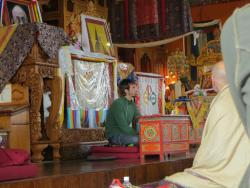 Second Discourse: The Five Senses and Love
Second Discourse: The Five Senses and Love
[Osel’s testing microphone out.] Whoops, okay. I have more practice now. Hello. Just have to get the breathing right.
Okay, so thank you so much for coming again. I’m sure, I mean, I think the faces look much more relaxed than the other day, less tired. Today was like a vacation, right? So I know you did korwa, so I know. And tomorrow you’re going to Boudha, I believe?
Yeah, so when you go to Boudha, make sure you ask for your wish, or your, what you would like to accomplish because always all your wishes are, they come true when you wish it hard enough. Because it’s together with what we feel, inside of us, and that is our truth, of course, combined with the truth where everybody believes that. So it becomes very powerful. So in Boudha, all the wishes come true. So it’s double powerful. So just make sure you make beautiful wishes for all your life, and desire to help the sentient beings.
Most of the time, I mean of course, you’ve already done the November course, you know about karma, so motivation is very important. Not only “me, me, me”. For other people always. And then the ‘me’ will come automatically; you don’t have to worry about that.
So translators …you’re not translator today? You’re on vacation, also? Okay.
So I just wanted to congratulate everybody with their precepts. I know it must have been really, really hard. I have a really hard time not eating when I’m hungry. So good job. Congratulations.
So you’re almost in the end of the November course. I just want to ask you from the bottom of my heart just to be aware of the opportunity that you’ve had, and you have, and the habit that you’ve created, and to keep that habit when you go back to your home, to your normal life, just try not to let the old habits, like the negative habits, kick back in. Try to keep the habits from here as much as possible. It will help you for the rest of your life. So just try to keep that in mind because now you have that state of being, that flow. So when you get back into like the city or, it’s hard, of course, to keep it but inside you can keep. So just try to focus on that, try to see that goal, so that before you even get there, you already have it clear, and don’t get lost or sucked in to the distractions and samsara, etcetera.
So let’s start with some gratefulness. So gratefulness for this body. It’s so important always to be grateful for the body because this is what we have for our life – it’s all we have, the only real thing that we own.
So that’s why I just want to emphasize on that because many times we forget. It’s normal, we have a body, it’s normal. We’re just focusing outside all the time.
But the most important part is our body and what we have inside, because we are with our body all the time, 24/7. So just to be grateful.
So I just want to go through the five senses that the body has. Most of the senses are information coming from outside. And through that information, we are more connected to the outside world. It helps us to understand what is going on. So we should be grateful to have those five senses, which some people don’t have all five.
So we start with the sight, the light; light is information. When you turn on the light, when the sun comes out, then you can see what there is outside. When you’re in complete darkness, then you don’t see anything. There’s no information coming from the images.
It’s interesting sometimes also to think about that. Like when you do meditation; it’s important to do analytical meditation as well as practical meditation. So the analytical meditation is, it starts like that, where you actually investigate and try to understand. Maybe it’s difficult to understand because ultimately, understanding is just a concept. But try to feel and engage in what is happening in those moments. The contact we have with outer reality.
So the sight, we are grateful for the sight we have. Right now, I’m so grateful to be seeing so many beautiful faces. Really, this is very beautiful.
So thank you to the sight. We can move around, we can do also our jobs, we can, I mean, there’s infinite, infinite situations where we need our sight, and thankfully we have it. So let’s be grateful for that.
And the smell. How incredible is the smell? You can smell something and you can identify what it is – be it good or bad. You go in the restaurant, “Hmm, it smells so good. Ah, I’m hungry”. And you go near a toilet, “Oh!” It’s amazing, you can identify the source of where the smell is coming from. I mean, it’s amazing. And it all, it’s only the air, you can’t really see it. Can’t see smell, can you? But it’s, so the smell and the speech with which we can communicate with each other, imagine that there was no speech. You have to do like sign language. How hard is that?
So we have the opportunity to be able to communicate through speech. So that’s why it’s important to respect the fact that we have the possibility to do that. And when we do speak, try to think before you speak., and really see whether it’s got, it’s beneficial. Or maybe ‘beneficial’ is not the right word ‘cause it’s so generalized, like speaking – we always speak, so you can’t always check if it’s beneficial or not.
But at least check whether it’s worth it or not. Just talking for talking, sometimes is just, I don’t know, it’s just a waste of energy – unless, of course, you’re sharing information, you’re learning something.
Sometimes it’s good to just talk, but not always. Like people can talk for hours and hours and hours about just gossip or whatever. And sometimes it’s just talking about other people and judging other people or criticizing people, and that’s, there’s not much point there ‘cause ultimately, you’re harming yourself when you do that. So that’s the wrong type of speech. It’s not the type of speech you would want to use because we have that the gift, we have that opportunity. So when you use it, just be aware of how you use it [pause] – apart from being grateful, of course.
And the language. Of course the language is amazing. How could we communicate if there was no language? Facial expression, theater, maybe? But there’s so many sophisticated words to express yourself that sometimes without language, there’s so much limitation. So the fact that we can actually communicate, it’s really amazing; I’m so grateful for that every day.
And, of course, we have the physical contact. The tact, sometimes it can be painful, sometimes it can be pleasurable, but it’s there. Our body can feel. We can feel cold, we can feel heat. It depends, [pauses to say] oh, I think, translating is working now. No vacation! Okay, I’ll try to go slowly, okay? Thank you.
So I mean, so one of the types of suffering is the physical suffering, of course, which is through sensations. And it can be very hard sometimes, like sickness, and that’s one of the, I think, basic physical suffering is through the sensation. And, of course, many times it’s difficult to kind of cope with that. But it’s always, we can make it less by using our mind and our thoughts and our feelings, and not paying so much attention to that.
For example, if maybe you have broken leg or something, or I’m sick, stomach pain or a flu, fever, whatever. Maybe I can be feeling really bad like, “Oh, poor me, and, I’m suffering so much.
So then if I just think about that, then it make, becomes really big. Then I suffer much more. So then the fever becomes like this amazing fever I’ll remember all my life. Yeah, I’ll tell everybody, “Oh, yeah, when I got this fever, I hallucinated and everything – it’s amazing”. No, but I mean really bad; I mean, not ‘amazing’ kind of good. But anyway it’s going to the point.
So for example, if I concentrate on other people’s suffering, like people who are really suffering a lot, like in Africa or in places war zones, and then I can realize that actually my suffering is nothing compared to those people. And I’m really lucky just to have that suffering – it’s not so much actually; it’s just a fever, tomorrow it can get cured. There’s some chronic diseases which it exists, and at least in this moment, I don’t have it. Or if I have it, you can always think about something worse which other people do have.
So in that way, we can really work with our suffering and change it into compassion, into bodhicitta. So it’s stops being, ‘Me, me, me. I’m suffering, Poor me!’, into “Wow, this is just a little bit of the suffering humanity has to go through. Let me try to use this suffering and visualize that I’m taking other people’s suffering through this, and purify”. And through this, just think positive, and your suffering will become smaller in that way. Yeah, so anyways, I’m going on with the subject.
But the five senses, and the last one would be hearing. So hearing is amazing because it’s another type of information which we cannot see, of course. So that’s why, there’s so many things that we cannot see with our eyes, because many times people say, “Oh, if science doesn’t say it, then it doesn’t exist?. Or, “If the government doesn’t say it, it’s not true”. Or, “I don’t believe it because I can’t see it”.
Then it’s, sometimes it contradicts the reality because there are so many things we cannot see, that it doesn’t really make sense to negate, or say, “It doesn’t exist”, like, for example, karma. Karma exists in the way that, for example, the scientists through many hundreds of years have been investigating, and they’ve discovered many new discoveries every so often.
The same way that also mind scientists, even it goes even further away than the actual science we know today, because those people, they started thousands of years ago, even maybe at the time of the prehistorics. Maybe there was no science there, maybe the science was like fire, and the javelin, but at least it was some kind of meditation, some kind of ritual, where people would come together, maybe sing or make music, make drumming, go around the fire, I don’t know, like the American Indians. It’s a ritual – that’s meditation also. It’s communicating with yourself.
So from the beginning of humanity it’s existed. And now, there’s many different ways of the information has arrived. One of the types of information is Buddhism. And so all of you have had the opportunity in this time to attend the November course and learn about that.
And I mean, from my point of view, the lam-rim is more than enough for the whole lifetime. If you get a good understanding of that, that’s good enough. So we have that opportunity, thanks to the hearing, of course.
So let’s just concentrate on those five senses. Of course, for example, hearing we can enjoy by listening to good music, the type of music we like, of course, because not everybody likes the same music. Some people like very chill music, some people like heavy metal, so it’s different for every person, right?
So let’s just meditate on that, for maybe five minutes, on the five senses and on our body, and the gratefulness for having that. And try to keep that gratefulness constant. Even if you can’t, it’s not a problem. Just try to be aware, once in a while; when you use the five senses, just to be aware [of] the opportunity you have, how magical it is. People forget about that. People forget about the magic in life – they just get lost in materialism and everyday life and their habits, etcetera. So let’s just, yeah. [pause for meditation]
I feel bad to interrupt the moment. It’s so amazing to see so many people in silence. interiorizing – it’s really beautiful. It really is. So, but I have to interrupt ‘cause it will become late otherwise, and maybe tomorrow you have to wake up early. I’m sure you’re tired also from today.
So anyways, you can also do it by yourself any time. Just keep in mind that any moment during the day is a good moment to meditate. You don’t have to sit down to meditate; any moment is good to meditate. Even if you’re in the toilet, it’s fine. It doesn’t matter. Meditating is not about having to be in a specific place, in a specific state of mind with specific people, no. Meditation is about yourself. So any time you’re with yourself. So that’s enough.
Okay, so I thought to mention something because last night I was watching this documentary about frequencies. It’s a very new documentary about maybe one week, two weeks old. It’s on You Tube. I posted it on my Facebook page just in case people, so if anybody wants to join, it’s just Osel Hita; it’s very simple. Just to keep you posted about things that are happening, information that I come up with. In Facebook, sometimes there’s lots of information, interesting stuff. So that was just a propaganda moment.
So I watched this documentary about frequency, and it’s very interesting because frequencies is something that scientists have only started to discover in the past maybe a hundred years, or even maybe less than that.
And normally, of course, we kind of know frequencies because like vibration, like the singing bowl when you turn it around, can feel the vibration, or the vibration of the voice – there’s many different types of vibrations. So I think people have known a little bit of vibration but frequency’s a different concept. So sound is like, it’s like this vibrating magic, and it’s part of the frequency also.
So the documentary was talking about a thing called the Schumann resonance. It’s a scientist called Schumann and he discovered that the earth, that the resonance or the frequency of the earth is at 7.83 Hz. I have no idea what that means but at least that’s the information. And it turns out also that the human beings resonate at the same vibration, the same frequency.
And one of the experiments they did that I saw on the documentary, was that they would take people underground and shut them off from the actual frequencies of the earth because the frequencies underground are different from the ones that we have outside. And the people would become sick and they would get very tired, and they would get a lot of lüng, and stuff like that would happen because they were not in contact with these frequencies from the earth.
So I just thought this was a very interesting concept because it’s true, like when you go into the countryside, you go outside of the city where it’s full of frequencies like the cell phones and the wi-fi and the internet, all that is frequencies everywhere. And when you go outside into nature, you really feel so good because you’re free from all that.
And also one of the good things in the November course is that they confiscated cell phones. So I’m sure you keep ... one of the factors of feeling good is because you don’t have that frequency resonating with you all the time, which is what happens when we carry cell phones with us all the time.
So it’s something that has not been very well-investigated yet because it’s very new. And basically, like cell phones and the wi-fi frequencies, it’s not that they actually cause sickness or like cancer and stuff like that.
One of the things that I understood, I’m not sure, but that’s a thing what I understood, is they lower down the quantity of melatonin. Have you heard of melatonin before? It’s a special liquid I they think we have; it’s like an antioxidant – very, very powerful antioxidant which is released when we sleep.
So the senses are right behind the eyes, and then when it’s dark, then the brain releases that substance – melatonin. And basically what it does, it regenerates all the cells and regenerates our body, and I’m not sure, but I think the numbers were around one billion cells – that regenerates a billion cells a day that we lose or that destroyed or whatever in the night.
It may be an exaggeration but it makes sense because our bodies are composed by many, many, many, many, many cells, billions and billions and billions. It’s like a universe inside a universe inside a universe inside a universe, which is saying it’s infinite. When you go out, our planet is like the galaxy, the galaxies in the universe; the universes in some other universes. It just goes on and on and on and on. And we’re just this tiny part; we think we’re so important, which is normal because we are the center of our universe, right? We live in our body. It’s normal that we have that preconception. But of course, we are very important but we are very small. Just have to keep that in mind.
And I just remembered a phrase that I like very much. It goes like this: “Be proud for you are, but be humble for you belong”.
And basically, when it says to be proud for you are, it doesn’t mean be proud like, oh I mean, like a snob or something. No. It means be proud of your potential, be proud of what you are. Respect yourself. Don’t underestimate yourself. Don’t push yourself down. Just be proud because you are; you are what you are.
But at the same time, be humble because you belong. You’re part of something, and you depend on something constantly in order to exist, starting from our body and all the different particles of our body.
Even to eat, we have to live, we have to eat. So even every day, our life is based on having to drink water and breathe air and eat, and also maybe even relationships and contact with other humans. So all these things are factors that we need every day in order to live. So we are part of everything. So that’s a big reason why we should be humble.
So I just really like that sentence. It’s nice: Be proud for you are, and be humble for you belong.
It’s like, I mean, it’s amazing, I just remembered. For example, our heart is beating all the time, right – boom-boom; boom-boom; boom-boom, right? And the beating, basically it’s expansion and contraction our whole life. And the universe is doing the same thing, or at least that’s what the scientists say. I don’t know if it’s true or not, but they say the universe expands and contracts. Right now we’re in the expansion moment of the universe.
So it’s a little bit almost the same, right? Our heart is doing it constantly; the universe is also doing it right now. It’s just that the time of the universe is so huge, like even a million years for us is like one second for the universe. It’s nothing.
But we can feel. It’s like for example, the time for the trees and for us, it’s a different type of time, it’s a different type of change, maybe almost. Maybe the change is the same, I don’t know, because all particles moving constantly.
And of course, frequency. Frequency is one of the main factors of movement, of time because time is based on movement. So anyway, I’m going far from the subject again.
But I just wanted to make that metaphor, the heart of the universe; it’s really interesting. It’s like dualism – like female and male, night and day, good and bad. I mean there’s just so many types of dualism in our existence. It’s just interesting just to think about it, just to see, say, “Wow, look, huh”. I mean maybe it’s always two, but the two maybe become one or something like that, I don’t know.
Anyway, now I’m just going back to the frequency part. Just like, for example, I know many of us, we have to live in cities, and we are there – one of the numbers I heard in the documentaries, around four billion people in this planet have cell phones. And they started building cell phone towers, I don’t know, maybe 50 years ago or less, maybe 20 years ago. And now everybody in Nepal and India, Africa, everyone has cell phones – so cheap.
And I mean it’s something that sometimes scares me because we don’t really know the effect or the consequence of it; it’s not really known yet. So, but one thing I do know is that the tests are made, the cell phone that affects the person is based on a grown up person.
So I know today there are many young children maybe who use phones at a very young age. So strongly recommend not to give your children cell phones, at least until they’re old enough to have the skull thick enough so that it doesn’t affect them so much.
But of course, I’m not scaring people or anything. I’m just saying, just to be aware of that, and try to use the phone less. And if you can, at least maybe use the speaker or maybe cable, maybe don’t put the phone next to your head so much.
Of course, each person is different so I mean for me, I’m just saying this because I want to help you. It doesn’t mean I want to scare you. Fear, it’s not good. So fear is not the point why I’m saying this. It’s just to be more conscious. Okay. So don’t misunderstand me, please. We have enough fear in the world already.
So karma is a little bit like that. You cannot see it but it’s there. And then sometimes you can see the result of karma, like instant karma, it can happen. Like this time, when I was in Bali, I had, we were all going to go somewhere, and we had rented a motor bike and the keys disappeared. Then suddenly, everyone was going and I couldn’t find the keys. So I was looking for the keys for an hour everywhere. I was freaking out. And I had left them on the table but I just couldn’t find them; it was so weird. So anyway, so finally I gave up, and said, “Okay, let’s just stay at home. Everybody left”. We stayed at home and, relaxed. So it’s fine.
Except what happens in sometimes life, you have to adapt to what happens. Even though sometimes our projections tell us what we want, and when it doesn’t happen that way, then we get really pissed and angry and frustrated. But that’s one of the practices, when that happens, if we know how to adapt, then we feel good about that. And then sometimes it’s even better – the situation, something better happens. So anyway, just keep that in mind. Sometimes if things don’t happen like you want them to happen, it maybe for a reason and a very good reason, too.
So anyways the story goes that after two days, so it’s so funny because in Bali immediately the next day, we got a copy of the key. Two Balinese, they took a hose, tied the hose to the bike, the motorbike, and carried the bike to the key-maker or whatever. And then in one hour, they had a new key for the bike.
So then after two days, I went to visit a friend and result’s that he had the key; he had taken it by mistake, and he had it in his backpack. So he gave me the key back and I went, “Okay, now I have two keys. That’s great”. And then he had to leave. And suddenly, he couldn’t find his key. So he was searching for one hour for the key. And then he had to do the same thing. He had to get someone to make a copy of the key.
But it’s so weird ‘cause the moment he gave me the key, ten minutes afterwards, he needed the key for his motorbike and he couldn’t find it. That was like the most recent, instant karma experience I had. It may be coincidence but maybe not. I don’t know.
So sometimes instant karma is good, because it makes us see how karma works. For example, I have a friend back in Spain. He was a bit naughty and he stole something in a supermarket. And that same day, his wallet got stolen and he lost a lot of money.
So that was like instant karma for him. And since then, he never again stole anything from anyone or anywhere. Of course, before he used to always steal from like supermarkets, stuff like that. It’s just like, I don’t know why. But anyways, he learned his lesson.
So it’s a good thing that sometimes instant karma happens immediately because that way we actually see the results of our actions. And also it’s very lucky because that way we purify faster. So sometimes, stay aware of that and try to keep in mind that karma does exist, and it’s based on the scientists of the mind who have been experiencing this for a very long time. And it’s been passed by word of mouth and through experiences up to now. So I just want to emphasize on that again because tradition is based on that.
So it’s just we have to be able to filter what works for us through tradition. But tradition is there, thank God. It’s so beneficial, so helpful because that is what we have from all those generations. So anyways, I don’t want to talk so much about one thing. So that’s that.
So we as individuals, we have so much power and potential, we must use this opportunity, especially now that we have been introduced to the lam-rim. So just keep in mind the fact that you have been here, you’ve made all these connections, you met all these beautiful people, which I’m sure many of you will keep meeting throughout your life. And it’s amazing friendships will arise from this course. Maybe many friendships already happened from other courses from other parts of the world.
So just feel rejoice for that, and just keep in mind the lam-rim and what Venerable Gyatso has taught all of us. And so much dedication, so much hard work from his side. And he’s such an amazing monk and such an amazing person that we are so lucky to have him here amidst us.
So just keep that in mind, and really respect that. Don’t go back home and say, “Okay. Whatever”, like, “I understood some of it; I didn’t understand some of it, whatever. I’m just going to go back to my old habits and that’s it”. Because then afterwards, your body will actually tell you, you’ll see it for yourself that actually it’s good, it’s helpful.
Sometimes our mind plays tricks on us; it makes, believes things like grasping mind or your obsessive mind, it makes this big, powerful kind of thought which becomes even like an emotion or a feeling or, and then we get lost in that. So we just have to tame that, keep that at bay always. Especially see whether that’s good or not, if it’s beneficial for us and for the rest of the people that surround us. I just want to emphasize on that again also. It’s very important to take the opportunity that you have, that you have had in this course, and use it for the rest of your life, and help other people to be inspired by that, too, in your own hometown or your city or your family, wherever you’re going to go back.
So try not to get sucked in into you your habits and your everyday kind of life where you don’t, when you’re not conscious. Of course, you have to do your everyday life; you have a job, you have to do the job. But at least now you have the technique of maybe not to get stressed so much, to be able to breathe, to be able to do some meditation, to be able to be kind to people in the workplace. All those things, you have that now. So when you go back, it’s going to be different. Of course you have to go back to routine in your life, that’s normal. We have to live, right? We have to pay for our family, we have to pay for ourselves it’s the way humans have built society, and the system has created this kind of way of being. So it’s normal, it’s nothing new. But just try to keep in mind what is good and what is bad for you.
So it’s so important to keep the purity that you have achieved in this month, the purity that you have right now. I don’t want to bore you with that any more.
So I just wanted to talk maybe about love a little bit because I think there’s some questions the other day about your partner, and how to live with your partner and relationships and all that stuff. And I think last time, we didn’t have much time so I wasn’t really able to go very deep. I can’t really go too deep because I, myself, am still also learning what love is.
So I just want to share a little bit what my understanding of some things that we should be aware of what love can be sometimes.
So love has many views. There’s different people who see love different ways. Love has always existed; it’s part of the human beings. It’s, for me sometimes love can be the same thing as just like God or yourself or the guru or the omnipresence or the collective memory, sometimes even maybe evolution or karma. I don’t know, maybe it creates confusion thinking like that? But sometimes, it’s interesting to think, “Oh, maybe it’s the same thing. It could be the same thing”. Because love is everywhere; it’s not something that we can point at. Love created us, love keeps us alive and it’s the energy we have, I mean, it’s got so many different names, and so many different views.
So I don’t really want to generalize or specify anything. But I just want to make sure that you understand what love is not, what love is not. Because today in this society, many people confuse love with other things which are not love.
So for example, today, in today’s society, love can be mixed up with like grasping or obsession or attachment. It can even be related to suffering – like people suffer from love, from love. But it’s not real love because love, you never suffer from love, there’s no suffering that comes from love. Love creates no suffering – the real love, of course.
That’s why I just want to talk about what love is not. I mean, after love can be anything you want it to be. But at least you know what it’s not, which many people believe it is.
Sometimes in a relationship, oh, you think, “Oh, I love this person”. But then you’re like, putting so much pressure on that person, you don’t let them breathe sometimes. And that’s not love, of course. Love is, there has to be space. Without space, there’s no love. From space, then love comes out from that. I mean, if there’s no space, how can there be love? I don’t know, does that make sense? Maybe I contradict myself, I don’t know. But at least for me, it makes sense.
So just going back in time a little bit. Back in the days, maybe couple of hundreds of years, thousands of years, I don’t know, love was a different story. Maybe love letter, very romantic love letter would be written by somebody, and they wouldn’t see maybe for year or two years. Maybe the letter would take months to get to that person. You would never even know if it reached that person or not. Maybe no answer would come.
For example, you have to take a boat from, I don’t know, from point A to point B, it would take maybe three months, and you have to navigate, or even walking, anything can happen: you can fall sick, you can have an accident or fallen from the horse, I mean, it was so easy to die back in those days.
The medicine was not as good. And there was no opportunity to for example, even like chicken pox or appendicitis. If I had lived, maybe a thousand years ago in this body, I would probably be dead by now because I had appendicitis, and that would have probably been the cause of my death. But that can be, I was able to have the operation done and here I am today.
So that’s one of the things, back in those times, love was very different because you really appreciated the person, you really emphasized or you really gave importance to the person with you. It’s like so special, that moment.
There’s no cell phone, you can’t like, “Oh, by the way, I forgot to say blah, blah, blah, blah, blah”. No. The only chance you have to talk with that person was when that person was in front of you. And then maybe once you’re gone, they have to travel somewhere for months. Then you’d write a letter maybe – very, very romantic letter, starting maybe, “Oh, my dear love. My sun, my light, my breath, whatever. You’re my moon. I love you more than the moon loves the earth”. And stuff like that.
Today sometimes being romantic becomes cheesy. If you tell someone, “I love you” too soon, they’re like, oh, they get nervous or they get stressed. So you have to be careful. Oh, maybe I shouldn’t say, “I love you”, because she’ll get paranoid or she’ll run away.
But back in those days, there’s no, like you have one partner in your lifetime. The person that you actually connected with or maybe you can call it ‘soul-mate’. Everybody’s a potential soul-mate if you don’t project too much. But it’s, I mean it’s beautiful when you actually are able to connect to someone.
Of course, today there’s so many changes because it’s unsatisfaction. Unsatisfaction is the basis of today’s society. It’s like the way even capitalism works, the way the whole economy system is based on is sometimes on unsatisfaction. You want more than what you have, more than what you already need to survive.
So anyways, going back to then, so that’s why love has changed a lot from back in those days. So sometimes it’s interesting also to maybe just think about how it was back then, and then think about how it is now, and then see that maybe many of the preconceptions we have are based on society and other people’s belief or whatever. So sometimes you just have to go back inside, go back to the old days to really feel that love that’s so intense, which of course exists today but it’s more generalized.
So for example, today love is based on appearance, right? Sometimes people base their, “Oh my God, this person – she’s so beautiful or he’s so handsome”. But maybe don’t even know what that person is like inside. But it doesn’t matter, I love her.
Of course, you love everybody, right? That’s a different love. I mean, that is love. And that is not the love we are talking about, right now. The love we’re talking about now is the confusing love, the love that people mistake for love. It’s not real love. It’s something that I think the word has been misused for quite a while now.
And for example, the appearance is influenced by the media, for example, the celebrities or, the magazines. If you actually check the original photo of the celebrity compared to what actually you see in an advertisement, it’s completely different. It’s like it’s complete change. ‘Cause, of course, first the person has normal face just like us, everybody is normal, like we are human beings. Of course we’re different, but we’re all beautiful because we are how we are, we are who we are. We’re unique.
So never think, oh, because that person looks so lovely, or beautiful in that picture, it doesn’t mean we’re ugly. I mean, sometimes people do that, because they compare with themselves; they compare with what they would like to be.
But you can’t compare because each person’s different. It’s not like, oh someone is more wise then the other person. It’s different types of wisdom. Wisdom comes from experience. So it’s not like, oh, he’s more wise than that person. No, they have different types of wisdom.
So you can’t really compare between such unique, functional beings, such unique things or people. It’s impossible. And that’s something people tend to do a lot. They tend to put themselves down because they compare themselves with what they would like to be, which is what sometimes the media makes them believe.
And sometimes, it’s not true what you see because the actual person is not the same person in the picture. They have to go through lots of like make up [‘maquillaje’], and then they take the picture, lighting, everything, and then after that in photo shop, they stretch the face, the eyebrows, whatever, and then finally they put the pictures in there, like “Wow! What a beautiful woman!”
But she doesn’t exist. She exists there as a picture. Or a beautiful guy, a very handsome guy, for example, “Wow, he’s so handsome! I wish my boyfriend was like that”. Poor boyfriend!
So it’s so funny – sometimes some people say, “Oh yeah, I’m madly in love. I’m so in love, blah, blah, blah, blah”, and then two years later, “Oh, I hate that person”.
How can that be? Then it’s not true love ‘cause true love is eternal; it’s not something that comes and goes. It’s something that’s there.
So those are just things that are not love, which we confuse with love, and from there we suffer. So I just wanted to specify that because I have had those experiences and I’ve suffered through that, and luckily I’ve learned a little bit. So I can share that with you. And so that you don’t confuse yourself with that, and just be aware that real love is unconditional.
There’s one saying I like very much from Thich Nhat Hanh. He’s my hero. He says, “Love someone in such a way that they feel free”.
And that’s so true because many times when we tend to love someone, we make them feel like sometimes they’re stuck, that we are always checking on them, making sure that, what they’re doing, where they’re going – it’s like a lot of pressure sometimes, and that’s… how can that be love? It’s, you’re actually grasping, it’s attachment.
When you suffer, it’s because you’re attached. You’re attached to that object of desire, and then that object of desire does not maybe reach what you expect, or maybe that object of desire….
For example, jealousy, for example, I mean why should you feel jealous if the other person is having, talking with someone and laughing? Some people actually feel jealous from that, and they get really uncomfortable.
For example, if their girlfriend is talking with another guy and they’re laughing, and you don’t know what they’re talking about, and you’re like, “Oh, no, what’s going on here?” Oh, I have to go there and disrupt the conversation or make sure I’m in front”. Then you just sit next to the person. “I’m her boyfriend, by the way.”
That’s so pointless because when you really feel love, when you see that the person is laughing, then you’re happy for them, you’re like, “Wow, that’s great! They’re enjoying”.
I mean, of course, another thing is when you go to sleep and the other person is somewhere, you don’t know where they are. And maybe then, maybe you can worry a little bit. But that’s another story. But at least when you actually see the other person enjoying whichever way, you should be happy for that person, not jealous or angry or worried. Worry. Real love doesn’t bring worry.
So all these things I wanted to share with you. Because I think that can help a lot in your relationship. Especially also breaking your limits in a relationship many times. We have limitations that we created from our childhood, like childhood traumas, maybe things that happened when we were really young or maybe during later on, later on stage in life. So then we create limitations. We’re like, “Wow, I have psychological problems all my life because when I was a kid, this, this, this happened”. No!
I mean, you’ve had many problems, but that doesn’t mean you will be that way all your life, based on that experience, that negative experience. You can actually break that limitation,
Some people, they can’t talk so much because they feel they’re not accepted or they feel like they’re different or they don’t, some people, they have difficulty speaking, maybe because of some childhood trauma. I don’t know. But if that’s the case, then you should really check whether that’s worth it or not because you’re carrying the weight from your childhood, and if you’re not careful, then you will carry the weight for your whole life. And then what’s the point? And then how many weights are you going to carry from all the traumas, and all the bad things that happened to you. You can’t. It’s just, in the end it’s going to squish you.
So it’s good to, of course, maybe sometimes even relive the traumas and experience it from your new awareness. Because every time you look at things, they are going to be different. Sometimes we shut it down, we don’t want to see it, and then that’s a trauma which is very subtle. And maybe when they hypnotize you, then that can come out. But sometimes you don’t have the opportunity to get hypnotized. So it’s good sometimes to go back, relive and see if from your new perspective. Then maybe you can digest sometimes. That’s one good way to let go.
Another way also is to see it, to use it in a way that’s beneficial for you. In a way that experience, it’s an experience. It’s something that you learn from. And if you’re able to overcome that experience, that negative experience, then maybe you can even help other people to overcome similar situations.
So always try to see the positive side of everything that may be bad or negative. Because there’s always a positive side. Because like we said before, this universe is dual, it’s from expansion, contraction. It’s always two things. For life to occur, there has to be female and male. So it’s the same way, even if it looks super negative, there will always be a positive side to it. And even also the positive side will have a negative side to it.
There’s another saying I like also very much. It says, “To light the candle is to cast a shadow”. I mean, you can’t not cast a shadow when you light a candle. It brightens the room, but it will always be cast a shadow, too – something that comes together with it.
Of course, Buddhism helps us with that. So I can’t really go much into that into deepness; that’s Venerable Gyatso’s job, but I think there is a way to be able to overcome negativity eventually. But when you do have negativity, just try to switch it and see the positive side, and use it in a more beneficial or more useful way than squishing you, or like carrying this weight on your back for a long time.
I did that for a while. And then I realized it was completely useless. It was based on my ego, which is like, “Oh me, I suffered! Or “Me, I had this bad time.” Or “This happened”, or... Then I just carried that with me all over, and I was conditioned by that – the way I lived, the way I talked with people, the way I did things was conditioned by that. So what’s the point? It’s already happened; it’s finished, it’s gone. You’re living another thing but you’re stuck with that from before. So it doesn’t really make sense. And I think many of us tend to do that.
So I think it’s important to be able to go through that and use it in a way that will help you. So you use it as an experience from which you learn, and you overcome, and then you can help other people to overcome that, too.
But because that happened to you, doesn’t mean you have to be that way. So that is called breaking your limitation. And sometimes when you live in a relationship, those limitations can cause some, what do you call it?
Ven. Gyatso: Friction.
Lama Osel: Friction. Thank you. It can cause some friction. So sometimes it’s good because in a relationship, you can break your limitations together, can help each other, our partner can be our best psychologist.
So even our friends can be our psychologist because they know you. So that’s why they’re very good psychologists. That’s what friends are for, is to listen and to help you understand yourself, and vice versa. It’s one of the things about having friends is that we can help each other by listening and sharing, and sharing our understanding and experiences, of course.
So there’s no suffering as a result from love. Just keep that in mind when you think about love in a relationship. If you suffer, then it’s not love. That suffering did not come from love. That suffering came from attachment or grasping or jealousy or whatever, all those negative emotions and thoughts, and stuff like that.
And of course, the hardest love to achieve is the unconditional love. But at least if you keep that goal, that vision that mindset, then one day, maybe you will be able to reach that. Of course, I don’t think I’m the adequate person to talk about that but Buddhism is basically, talks about that. One of the basis of Buddhism is unconditional love.
So I don’t want to keep you going here too long. So it’s been one hour exactly now. And I finished my notes. So perfect.
eah, so I think the November course has still, how many days left? ‘Til the eleventh?
Ven. Gyatso: Eleventh.
Lama Osel: Eleventh. So today, we are on the seventh? By the way, if you’re wondering what the monks were doing today before, they’re reciting Migtsenma. It’s Lama Tsongkhapa’s mantra. So they’re doing the korwa, circumambulation around the monastery, reciting the mantra because tomorrow is Lama Tsongkhapa’s day. Lama Tsongkhapa is the very beautiful statue we have up here; it represents Lama Tsongkhapa, of course. He’s the founder of the Gelukpa tradition, and he was an amazing practitioner – amazing.
So we have, tomorrow is Lama Tsongkhapa day and tomorrow, I think, all of you will go to Boudha, so make sure you make your wish or wishes. I remember, when I was a kid, I used to think, “What’s the best wish one can make?” I really wracked my brains, and I came to the conclusion the best wish is to wish to have infinite wishes. To me, that’s a good thing, yeah? So you can wish to have infinite wishes, and then you can wish all the wishes you want, which ultimately you don’t really need anything else. We have that potential, we have the possibility, the power of the mind, the power of the…. The individual is so powerful, that if we are able to focus and really feel whether we need that, we can make it happen, whether there is a stupa or not. But of course, the stupa will help a lot because the faith comes out, and the faith from everybody else, which affects the collective memory. And that helps the wish to become true more and more fast, and more strong.
So perhaps you have you any questions? I don’t know whether I should go through them or not? I don’t know – maybe you prefer using the microphone? Or maybe you prefer me to read these questions and answer them? I don’t know, maybe we can have a vote? I don’t know. Or maybe Venerable Gyatso can decide.
Should I answer these questions or should we send the microphone? From the audience or
Ven. Gyatso: From the audience? They’ve been pretty long, those questions.
Lama Osel: Okay, so let’s make it short. I’ll just pick some. But these questions are very complicated because I think the people thought a lot before. So there’s picky questions. [pause] I don’t know which one to choose.
Okay, so let’s just do.. it says “Questions for Osel”.
Number one: I think this is good, questions, because this way I can share a little bit of myself because I think it’s not, it’s not nice I’m just talking, talking, talking, but you don’t really know who I am or what I’m doing or anything. So I think that’s important to share also from my side. So anyway, so the question goes: “Are you planning on taking on students, or leading retreats in the future?”
I don’t have many plans for the future. I thought to keep it maybe, three months ahead, maximum. So after three months, I don’t really know what I’ll be doing. But one of the thoughts that I have is maybe for the next November course, if I can really get a deeper understanding of the lam rim, which is what I’m going to do after Kathmandu, I’m going to India to the monastery, to Sera Monastery, and Lama Zopa, he said that I should study the lam-rim from my teacher in Sera. So that’s what I’m going to be doing in the next couple of months.
So if I’m able to get a little bit deeper understanding of the lam-rim, then maybe for the next November course, I can try to give some insight or understanding or my thoughts, or whatever you want to call it, together with Venerable Gyatso and whoever will be teaching for the next November course. So that’s my wish maybe.
So for me, it’s very auspicious to be able to be here and talking with all of you because it’s the first time in the November course, and I think all FPMT started from the November course, so it’s really special and historical, for me at least. So I want to thank you to being able to make this opportunity, this moment a reality. Because without you, then I’ll just be talking to myself right now.
So then number two: “When are you going to be leading retreats?” I don’t know if I can really lead retreats, because technically, I’m not a Buddhist, yet, I’m in the process of becoming Buddhist and I have a hard time meditating. So I don’t know, maybe in the future, future, future, maybe. But I think, I’ll probably follow retreats in any case. I don’t think I’ll be leading retreat. Or maybe, I don’t know. Who knows?
So number two: “What are your goals and dreams besides enlightenment, in case that tops the list?” Yeah, enlightenment. That’s so far away. But I guess that’s the main objective, right, to become enlightened, to help other people become enlightened. But for me, that’s so far away, I never really think about it.
My goals and dreams, I think basically, my goal is to be a better person every day, try to go through what I’ve done at the end of the day when I go to sleep. Try to think about all my actions, and try to see what I did wrong, or what I don’t feel comfortable with by following all my moral code. Be a better person, basically it’s being a better person with myself, for myself and for other people. You have to take care of yourself, before you can take care of other people. So you start with yourself always.
And my dreams, I have many dreams like everybody. But my dream is just to be able to help Lama Zopa, and maybe take some weight away from him, so that he can relax. And I think basically, that’s the main reason I was born, and why in this life, I’ve had this opportunity of being in this situation. So if I don’t take advantage of that situation, or don’t do what I should do, would be good to do, then probably later on, I will regret a lot, I won’t be able to feel good with myself.
So basically, I think it’s my job. Maybe job is not the right word. It’s my responsibility, maybe, I don’t know. But anyway, it’s just – that’s my dream is to be able to do what Lama Zopa would like me to do in order to help people.
But basically my dream is to be able to reach people who are not Buddhist, and introduce them to Buddhism because I think they are the people who need the most help, people who do not have any contact with Buddhism, people who would never pick up a Buddhist book or go to any meditation course, who would even listen to teachings, or even just because it has the name of religion in it, then they’re like, “Oh, no! I don’t want to know anything about that”.
I think mainly my dream is to be able to reach those people, and to be able to give them a small taste of what Buddhism can be, and then introduce them to Buddhism, and help them in that way. I think that’s mainly my dream. That’s one of the reasons why I chose audio visual techniques, making films and stuff like that, because you have the power of sound, speech, you can condense any messages there, you can put music, you can give images.
Now I’m concentrating on documentaries. Maybe one day I’ll make a Hollywood action film, like the Matrix. That’s such an amazing film, right? Wow. Something like that would be amazing, but I think I’m very far away from that yet.
But anyways, tomorrow there will be screening of the new, official film, the first official film I did together with Matteo Passigato – he’s a very good friend of mine from Italy. I met him in ’98 in Bodhgaya, and ever since then, we’ve been in contact.
So we did this documentary together, and it was produced by FDCW, which is Foundation for Developing Wisdom and Compassion. And the documentary is about Universal Education, which is what Lama Yeshe started in the l970’s, and now it’s actually really happening. So basically, it’s just a documentary as an introduction to that. So I don’t want to go into much detail because I’ll do the presentation tomorrow. But just try not to miss it. If you’re interested, please come. I don’t know what time. I think it’s at five?
Ven. Gyatso: Three-thirty.
Lama Osel: Three-thirty. Oh, good thing I didn’t say ‘five’. Three-thirty, you’re sure of that? Okay. So three-thirty, not five. Yeah, maybe five in Spanish time. Two hours late. Three-thirty.
So anyways, so join my Facebook page. Just kidding. So thank you so much. I don’t know, maybe I should do more questions. I don’t know, it’s already nine, like almost [9:]15, so maybe we’ll just leave it there.
Student: Keep going.
Lama Osel: Sorry? Keep going. Okay. So okay, more questions.
Question: Do you, at some point, in the future, intend to officially start giving teachings, plus taking on students?
Answer: Well, I don’t know about teachings. I don’t feel very comfortable with that word, but for sure, I will, definitely I will share my experiences and my thoughts, and try to help people by doing that, which is what I’m doing right now. I’m just sharing my humble, small thoughts.
So that’s one of the reasons why I don’t feel comfortable sitting on a throne is because I like to be at the same level as everybody, because I don’t want you to see me as a guru or anything. I just want you to see me as a friend, as somebody you can talk to, somebody you can really relate to.
So that’s mainly the reason why, this is why I feel the most comfortable, not on a throne. I would never sit on a throne probably. Oh “Never say ‘never’”, right? Justin Beiber. So maybe, I don’t know anyways, so taking on students – well, I don’t know about students but, of course, I hope I’ll have many friends like you. So just think of me as a friend, okay?
Question: Okay, so will you/do you plan on taking over the lead at Kopan?
Answer: I don’t know about lead, but I’m just this small potato. I’m just somebody who walks around, and just listens to gossip, talks with people, has some tea somewhere, some coffee in the coffee shop. That’s it. Nothing else. I’m not the leader. It’s not like that. The leader is Lama Zopa Rinpoche, and basically, I’m just a follower, I just follow. So I don’t have any plans to take over and lead in Kopan, or anything like that. I’m just visiting Kopan; it’s my home. So I just love being here, and just enjoy being here and sharing with everybody, and talking and seeing people. That’s basically what I want to do in Kopan – nothing else.
Question: What are your close, future projects?
Answer: My close future projects. So basically, after this documentary, one of the things, the two basic things I want to do: one is to study a little bit more, maybe do some like communications, maybe economy, or leadership maybe a little bit. Even though I just said, I don’t want to be a leader, but I think it’s important to learn about leadership in order to work in an organization like the FPMT. So one of the plans I have is to study that for the next two years.
The other plan is after this documentary, maybe to create another documentary – ‘cause this one is just 15 minutes long. But the next one, it’s maybe one hour? And basically it’s about emptiness or spirituality together with quantum physics and science, coming together.
So the people who don’t believe in spirituality, then the really hundred percent scientists, they can see, “Wow, maybe spirituality has something to do with science; maybe it’s the same thing”. ‘Cause emptiness and quantum mechanics or quantum physics really blend together, you can really see how the principle is the same, the way they explained.
So I don’t know much about it yet but I really want to investigate and learn about that, and make a documentary. So that’s the other project I’m trying to do. So I welcome any help, any information, any suggestions from people. So those are basically the two projects. I don’t know more now, or have any more projects,’ cause then, it just becomes very vague. So I just focus on those two for now.
So that’s.. more questions.
Question: So one question here is, “Osel, are there any changes that you would like to happen in the monastic education for Tibetan Buddhist monks, and nuns?”
Answer: I mean, I don’t feel there’s any changes needed because the way the system works is very, very, very good. It’s based on how it’s been working for a long time, and it’s always worked very well.
But I think, one of the things that I would like there to be is some exercise. Maybe not sports because that’s very competitive, but at least like some stretching exercise or maybe even yoga, or some kind of exercise like that. Because the monks many times, they sit for a long time during the day time, and then if you don’t do exercise, then it can create back problems, it can be very unhealthy. So that’s one of the changes I would like in monastic system.
Like Thich Nhat Hanh, in his monastery the monks do exercise every day, stretching exercises. They even play music which is hard to believe, but it’s true. I learned that last month. They have this special time, free time where they can actually play music, and they have violinists and pianists and whatever. And it’s beautiful music; it’s like an orchestra. So for me, that was very surprising that monks were playing music in a monastery. Wow!
But of course, it’s a different type of tradition. It’s based on Buddhism but it’s just different ways of seeing it. So for different people, different things work. But I thought that was very interesting. It doesn’t mean that I want monks playing music here, of course. I think the exercise part is the part that I was talking about. Don’t misunderstand me. It doesn’t mean tomorrow we’re going to bring a band here and play rock-‘n-roll music and concert in the gompa, something, like that. No! No! For rock-‘n-roll you go outside of the monastery.
Okay, so more questions. Let’s see.
Question: So one question. I think maybe this is the last question. “Dear Osel Hita, in your recent talk you said that when you were younger, you had difficulties, coming to terms with your situation in life in relating to happiness. Are you happy now? If so, what changed?”
Answer: Am I happy? I don’t know. Happy is a concept, right? So it’s not like, “Oh, I’m happy”, because tomorrow I may not be happy. So then I was not really happy now. So it doesn’t really make sense to say, “Oh yes, I’m happy”, because tomorrow I may be crying. So then I wasn’t happy. Right? Because I’m crying afterwards. So where’s the happiness?
I think, so happiness is for me, it’s easier to tackle, like the other day I said, by thinking not being unhappy. So I’m not unhappy, that’s for sure. So that could be in a way I could say I’m happy. But happiness has a concept everyone is looking for, that concept is very difficult to find. It’s not something you go afterwards. It’s a little bit like the donkey going behind the carrot, and the carrot – it’s a guy with the stick, and the carrot’s hanging. So the donkey’s going behind the carrot, but he never really reaches the carrot.
So if we think about happiness in the way that many people think, especially in society: “Oh, like I’ll be happy when I have this house” – materialistic point of view. Then that happiness is impossible. You’ll always be searching, going after something which will never happen ‘cause actually that will create more suffering; it won’t create the happiness.
So anyway, so am I happy now? I can say I’m happy for sure, because I’m not unhappy, right? But not the happiness that people talk about. So it’s, maybe this should be two words, I don’t know, like for love also, should be different words – like ‘unconditional love’, maybe ‘unconditional happiness’ we can call it. So I’m not unconditionally happy, but I am happy. Yes.
So what changed? I think what changed is basically, the perception I had of why I was suffering. I was suffering because I believed I was suffering mentally. And the change really was that I realized that I was suffering because I wanted to suffer, because of my ego. It was me who was thinking about myself, saying, “Oh, poor me, and this and that, and blah, blah, blah, blah”. And then I was suffering because of that.
So I still suffer, of course, because every day is a different day, and we die when we go to sleep, and we are reborn when we get up in the day; in the morning-time, it’s like being reborn again. And every day is different. So you never really know what’s going to happen, every day can be different, –things can happen that make you unhappy, or make you suffer.
But suffering as a state of mind, I don’t suffer as much anymore because I really try to see the root of that suffering. And that came from my ego, from me saying, “Oh, me, me, me, me, me, me”. And then that’s something that Eckhart Tolle talks about. He says.., in Spanish you say, ‘cuerpo de dolor’. I don’t know how they say it in English.
Student: Pain body.
Lama Osel: Pain body. So that’s a little bit kind of the same thing. It’s like we create the suffering from our ego because we always think about ourselves, and then that increments that suffering.
So I think that’s one of the things that changed was that I read Eckhart Tolle, The Power of Now. I read that and that helped me a lot to see that, to change that. So that was one of the things that helped me not to be so unhappy. And so to me for me that’s.., I hope that answered the question, didn’t make too much confusion.
So maybe now we can do some question and answers from, with the microphone. Just in case there’s some misunderstandings, someone wants to… [pause] We don’t want to take too long; it’s 9:22, right now.
Okay, so anyways, today’s vacation so you’re more relaxed. No precepts. You had dinner today?
[Students answer: Yes]
Good, good, good. So you’re not grumpy. I get so grumpy when I don’t eat. If I’ve got an empty stomach, then try not to talk with me ‘cause I’ll be very grumpy. How do you know if my stomach’s empty, though? Good question, huh? Then you can listen to my stomach, [makes stomach growling sound]. When it makes noise, then keep your distance. Just joking. So questions?
Question: So you mentioned in your last talk, and also in this talk, that we have a ‘collective consciousness.’ And so what would be your kind of interpretation of what that means, and how does it fit into a Buddhist framework, if it does?
Lama Osel: Wow, good question. Maybe we could think of it like karma also. Collective memory, it’s like something, ‘cause karma has many different types of karma. There’s a karma that is connected with all of us. Like right now, there’s a karma that has made all of us share this room. So that can be also a result from the collective memory. I don’t know. It could be.
The collective memory from my point of view, is like, it’s like the Hundredth Monkey Syndrome. Did I talk about that last time? No?
This experiment that they did about many different monkeys in different islands. And then all the monkeys were given sweet potatoes. So they would wet the potatoes in the water and then throw them in the sand. And the monkeys would eat them with sand. So it would be very crunchy and very uncomfortable, but they would eat them anyway because it was delicious, and they liked it very much. But, of course, it was very, it’s not nice to eat with sand.
So one day, one monkey discovered that if he washed the potato with water, then he didn’t have that crunchiness anymore. So he showed it to other monkeys also. Then slowly, slowly, the whole community in that island started to wash the sweet potatoes with water. And when around, I think, 100 monkeys, around, started doing that, then suddenly all the monkeys in all the islands started doing that, too, at the same time. And there wasn’t any real connection between them because it’s different islands. So I think that’s a pretty good example for collective memory. It’s like maybe when a certain number of that same species reaches a certain realization, then it helps everybody else to reach that.
That’s why it’s so important to focus on the individual because as we practice, the more we practice, the more realization we get, the more it affects the collective memory, which eventually will affect the people, the humanity also. So that’s why we can really make a difference in that way. That’s why it’s so important to really practice hard in order to help other sentient beings. It’s not like, “Oh, if I’m a good person I’ll be able to help that person on the other side of the world because I’ll go to Africa”. No. It’s like we will be able to help the other person on the other side of the world through the collective memory.
Thinking that way, then the motivation is, it’s even easier to keep that motivation. So it’s a good idea to think about the collective memory. In the same way also, our negative thoughts affect the collective memory. So maybe that answered your question a little bit. Okay.
Question: [Sorry. I’m a bit nervous.]
Lama Osel: That’s okay. That’s only your ego.
Question: We learned about the mind during the November course, about the power of the mind, and also about love, especially…I have a bit of a problem to describe ‘love’ and ‘mind’. It’s like when you go to the cinema, the guy with the projector is your mind, and the screen is your heart. And sometimes I just feel that all that is in the screen is what the guy’s projecting. Did you understand?
Lama Osel: Yeah, I understood. But I don’t think that’s a very good example. Because our heart is, like for example, this very short phrase I like to use is: ‘Being the self’. Right? Being, originally was, ‘Be the self’. But then I changed it to ‘being the self’, because we’re actually being, we’re constantly changing. So we can’t really be the self, because be the self is like static. So ‘being the self’. It’s a very simple phrase, ‘being the self’.
And when we talk about the self, I think we can also talk about the heart, it’s maybe the same? Maybe, I don’t know. But the heart is like our instinct, right. It’s our inner feelings, our subconscious mind. Maybe, I don’t know. I don’t want to create confusion because I’m also learning. So sometimes I may use words which may not make sense. But at least from my point of view, I think the heart is like a deep voice, it’s a real voice inside us. And the mind is something that is affected by everything else all around us. It’s like the conditioning. It’s a conditioner, something that’s been conditioned. For example, when we are born, the first words we learn is ‘papa’ and ‘mama’, ‘my papa’, ‘my mama’. That’s like conditioning already, first words, “my”.
So it’s a little similar, like the mind is, like it conditions actually our heart. So I would see it like, the other way around me, I mean the screen is the heart and the mind is the projector. Hmm. I mean, I think the mind affects sometimes. But we just follow the mind so much that we don’t really listen to our inner voice.
So I’m not really comfortable with the example you used because it can create confusion. But I think basically, we think too much; we give too much attention to our thoughts, which may come from outside also, which are conditioned. And the actual inner voice, we don’t hear it, or don’t listen to it.
And the best moment to listen to it is, for example, we go into to meditation, breathe deep. Or even before going to sleep, then you just breathe and you feel yourself and you try to stop thinking. I know that sounds very hard, but it’s possible.
You can start one second, stop thinking. Turn off the mind. One of the ways I like to use is like you become a stone, so you don’t exist. Or you can, like meditators don’t exist, so then you can’t think; if you don’t exist, you can’t think. If you’re a stone, you can’t think. Right?
Or maybe you can visualize a scenario, the curtains are closing, the curtains are completely black, so then the mind, all the images are like buzzing around, and the curtains close, then you can’t see anything [makes blowing sound], and then you just forget about what you’re thinking.
Or sometimes just concentrate on one point. You just concentrate on your breathing, concentrate on your heartbeat, or concentrate on some visual image you can make in your mind. But at least try to not think. Actually, from my point of view, it’s better not to have any visual images.
And then especially before going to sleep, so then you can actually turn off the mind, and the longer you keep it, the better. Slowly, slowly with practice; it’s not something that happens from one day to another. It will take time. But eventually, if you can stop the mind for ten seconds, then already that’s a realization. And then from there, you can keep going back to the ten seconds. And in those ten seconds, you will hear the real voice, the inner voice, the true self, who we are, unconditioned.
And that’s why it’s also good to do it before you go to sleep, because that way you manually turn off your mind. And when you fall asleep, you already turned off the mind. Because normally what people tend to do is you’re just thinking, thinking, thinking, thinking, thinking, thinking, you can’t sleep. And then finally, you get so tired, your thinking stops and you fall asleep automatic.
And many times, we can’t sleep because we’re thinking too much. So a good way to go to sleep is by turning off the thoughts, just feeling yourself, listening to the inner voice, and then you manually go to sleep. And that way, you’re more conscious of falling asleep, because sleep is actually one of the best meditations. His Holiness the Dalai Lama says that: He says sleep is the best meditation.
And also, of course, going back to what I was saying before, the melatonin is released during our sleep. So it’s important also to sleep during the night-time, because when there’s light, the melatonin is not released, because the senses are behind the eye. So it’s important to have a good sleep hours, like you’re doing now in the November course.
I’m a late night sleeper. Sometimes I go to sleep at 2 a.m. It’s very unhealthy; I don’t recommend it. I’m trying to change that. That’s one of the habits that I’m trying to change. But maybe it’s a Spanish thing. I don’t know, maybe it’s a Western thing, or maybe it’s a universal thing, I don’t know. It’s good to go to sleep early and get up early, so that you sleep in the night, in the dark hours, in the night hours for the melatonin to regenerate.
And also to have that schedule, because when the morning time come and the light, and the sun comes up, it’s like a ceremony; it’s nature’s ceremony. All the birds and the animals, they all celebrate the fact that the sun’s coming up. So why shouldn’t we also celebrate that? Why should we sleep in bed and just wait ‘til the sun shines so hard, we have to get up. “Oh my God. It’s so hot here”.
Question: So you mentioned be yourself, your true self
Lama Osel: Being yourself.
Question: Being yourself, true self, inner voice, these are all things that come naturally to me and I understand them. But here, there’s a lot of talk of no self. And that’s difficult.
Lama Osel: No self. Hmm. Maybe that should be a question for Venerable Gyatso. Maybe that’s, the no-self part is based on the emptiness concept? Of course, that’s a different story. It’s like, for example, there’s different stages of learning, and for example, you’re learning the Buddhist philosophy. One of the first stages it says the past and future don’t exist, because everything exists in the present. So everything in existence, only exists in the present. That’s what they say.
Like _. But of course, when we go higher up, when you study more the Buddhist philosophy, there’s a certain point which says “past, present, and future are all the same time”. So it changes. But of course, in order to reach that there, then you have to understand the first steps.
So from my point of view, I don’t really know much about that. So I’m just sharing what is practical for me at least, what I can relate to, and what I think maybe all of you can also relate to. But because I’m in the process of becoming a Buddhist, I’m still studying. So I’m not qualified to really talk about that in that sense.
And also I just want to say please don’t misunderstand me, or take me too seriously. I’m just sharing thoughts. So it’s not like you have to say, “Oh, this is the truth”, or just don’t take me seriously. Just take what works for you, check it, see if it’s really true or not, if it makes sense. And then if it’s useful, use it; if it’s not, just leave it. It doesn’t matter.
So any more questions?
Question: I just have a request. I know you’re a very busy person, but I would like to invite you, if you can come to our graduation on Tuesday, the closing of the.., I think all of us would love to have you and be a participant of our completing the course, if you can come to...
Lama Osel: Thank you. Okay sure, for sure. Yes, I’ll be very happy to do that.
So the question is, could you explain emptiness in your understanding?
Lama Osel: My understanding is so small, it’s difficult. I can’t explain emptiness but I can explain some parts of emptiness, maybe, that I understand.
I think first of all, in order to understand, or to start understanding emptiness, we have to realize that actually there’s a lot of things outside. And what we experience is what we experience. For example, a stone cannot experience reality the way we do.
In other words, you can even say we’re a reflection of the universe because through us, the universe kind of exists. I’m not sure if you understand. It’s, so all reality’s outside – it’s happening. And then we are just a functional being who’s experiencing it; it’s happening. And in order to experience it, we have to have the five senses, for example, or any one of the senses.
So basically, what we experience is inside us. It’s our experience, but it’s not necessarily what actually is out there. So that separation, it’s like the dualism. And then, we are composed by many, many different kind of cells or atoms, or like metabolisms, and all of those together create one, which is us, because when we think we are one functional being; we think as one. We don’t think as many voices or many people. It’s like one. But that one comes from a composition.
So I think those two things are like an introduction for emptiness – to think about that. That’s analytical meditation, to experience that, to think about it and experience it. Of course, practical meditation is very important also. But analytical is super important. So the two to be combined is good.
That’s kind of basically a little bit of the understanding I have of emptiness. I’m not sure if that is …
Venerable Gyatso: We’ll talk about it.
Lama Osel: Okay. I have to come to the teachings also. Okay, maybe one more question? Okay, two more questions.
Question: Last night Lama said that love is suffering.
Lama Osel: Love is suffering. He did say that? I don’t know. So yes, he did say that Gautama Buddha said that love is suffering. It can become suffering if it’s not unconditional love. But I think maybe he referred to the type of love that materialistic or samsaric people like us sometimes believe in – not the unconditional love. I very much doubt that the unconditional love is suffering. So maybe it’s just a word-play; it’s just misunderstanding from the words? I don’t know, I may be mistaken. Good question. It’s good to question always; very good to question; you have always to question, always, always.
Question: So last time you mentioned having been inspired by the works of Carlos Castaneda. Tonight you mentioned having been influenced by the words of Eckhart Tolle. Have you been studying karma from the Theravada point of view, or do you plan on doing so?
Lama Osel: I see. Well yeah, for sure, I’m very open to that and I would love to do that. But no, I haven’t really studied from the Theravada point of view yet.
One of the people also that inspired me was Krishnamurti, which I forgot to mention the last time. Because his life and my life are very similar, so many times I identified myself with him. And he helped me a lot also to understand myself, which is the main thing I’ve been trying to do since I left the monastery was to understand myself.
So I think also, all of you should do that, should understand yourself. So I hope I didn’t create much confusion. Please if I did, maybe you can ask me, or you can ask Venerable Gyatso. I’m sure he can clarify that for you. Please don’t take me too seriously. Give some freedom so that I don’t get very stressed when I talk.
Sometimes I talk, everyone’s so serious, everyone’s looking at me. I’m just joking. You’re all smiling; it’s so beautiful. Thank you so much. I really enjoyed it. And it’s beautiful to be here with all of you, such amazing energy. And please, please keep that energy going, keep that purity. Don’t forget what you learned here, and spread it when you go back to where you came from. And maybe see you next year at the November course. Maybe see you before that? Yeah, anyway, I’m going to see you tomorrow!
So thank you. Thank you. Thank you. [applause]
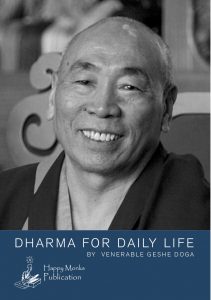 Below is an excerpt from Dharma for Daily Life
Below is an excerpt from Dharma for Daily Life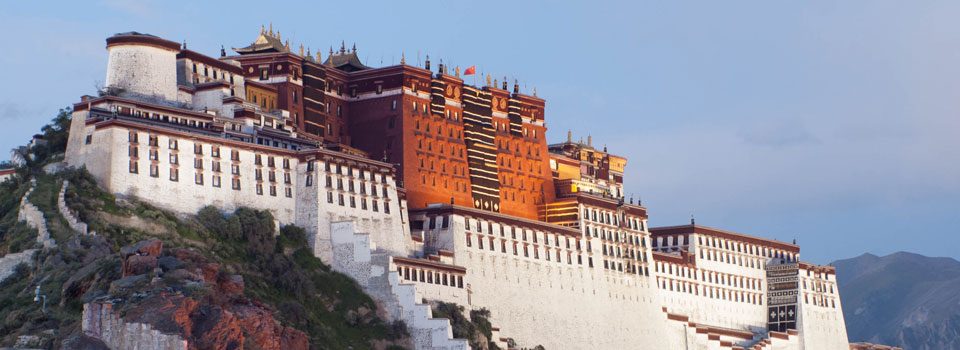
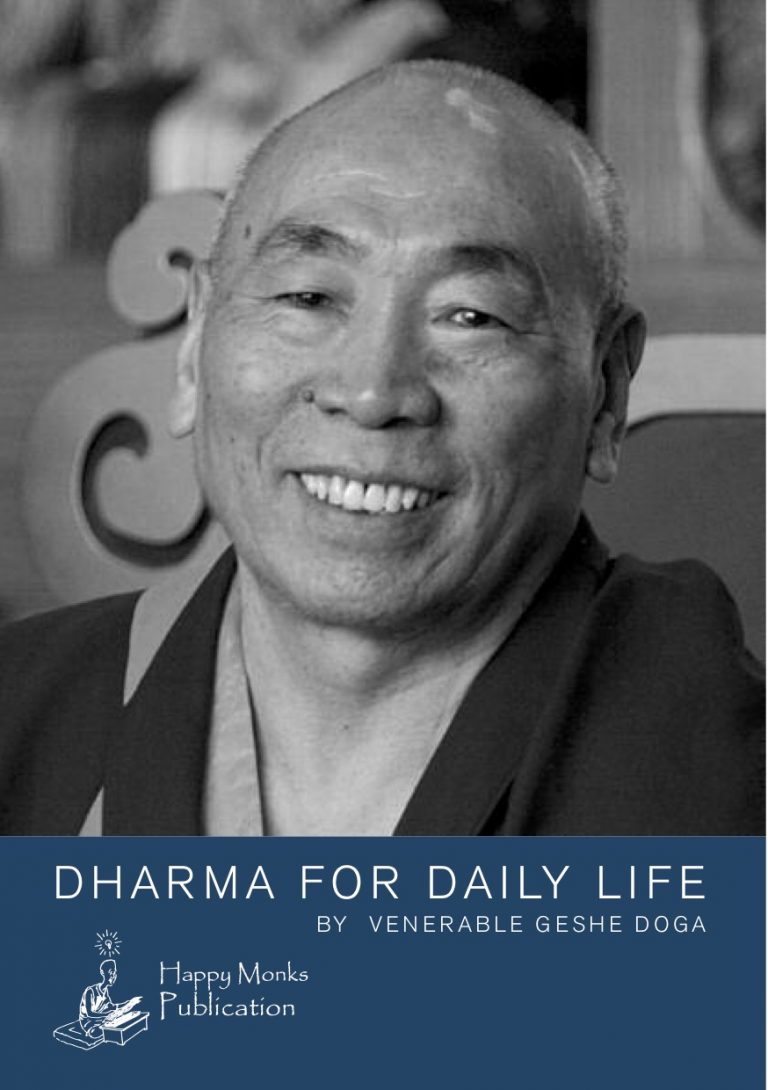
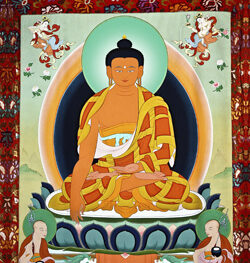
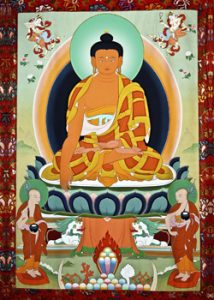
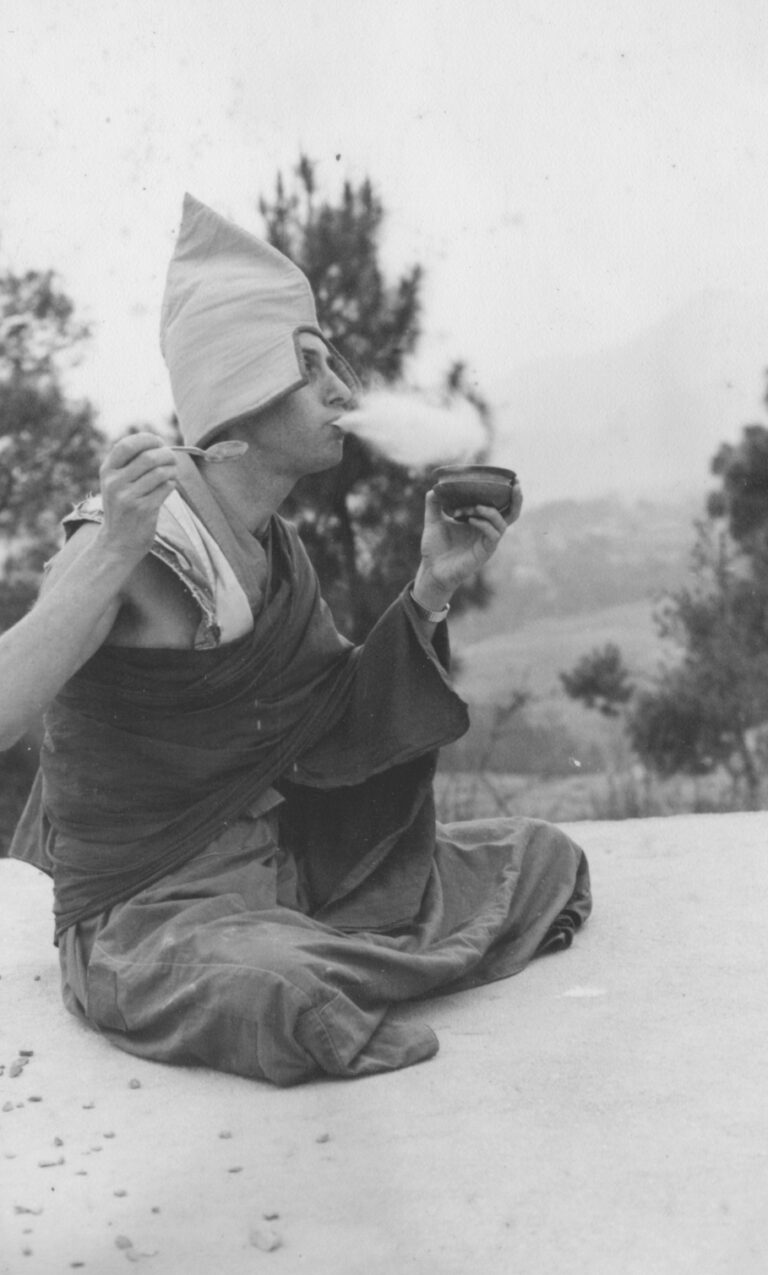

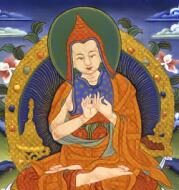
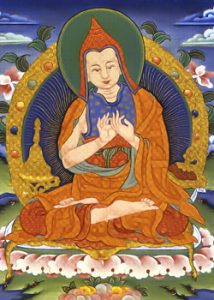 The Guru's Knowledge of the Origin of the Dharma
The Guru's Knowledge of the Origin of the Dharma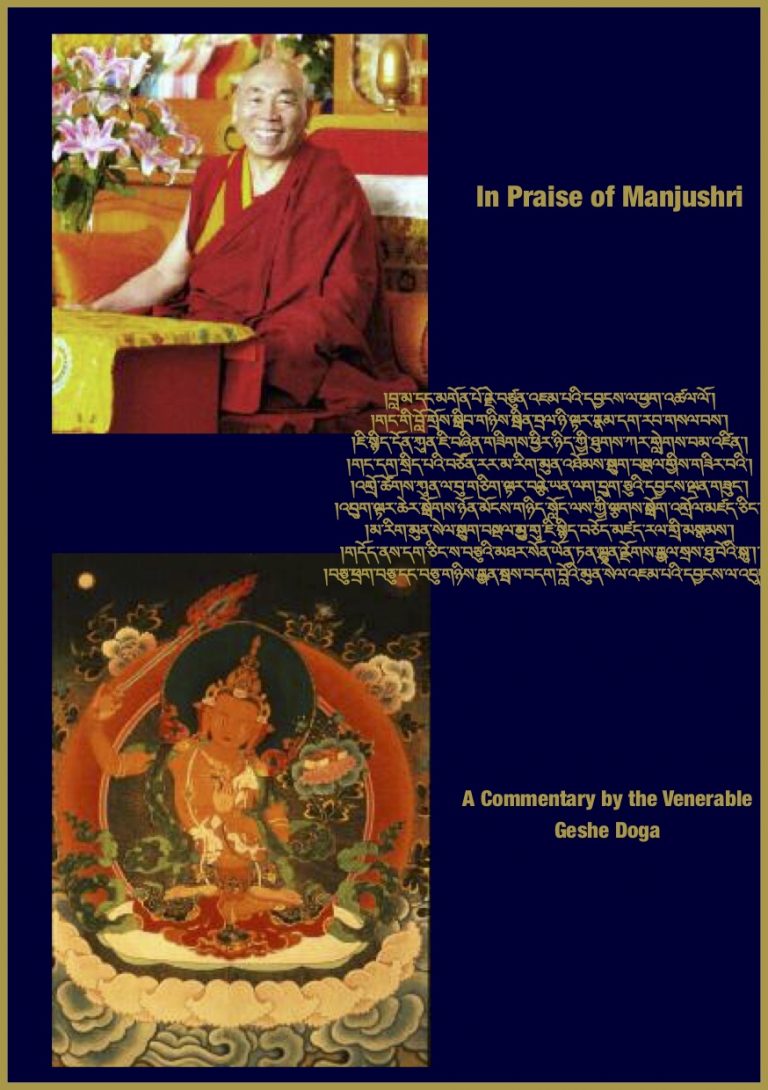
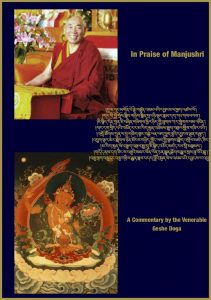
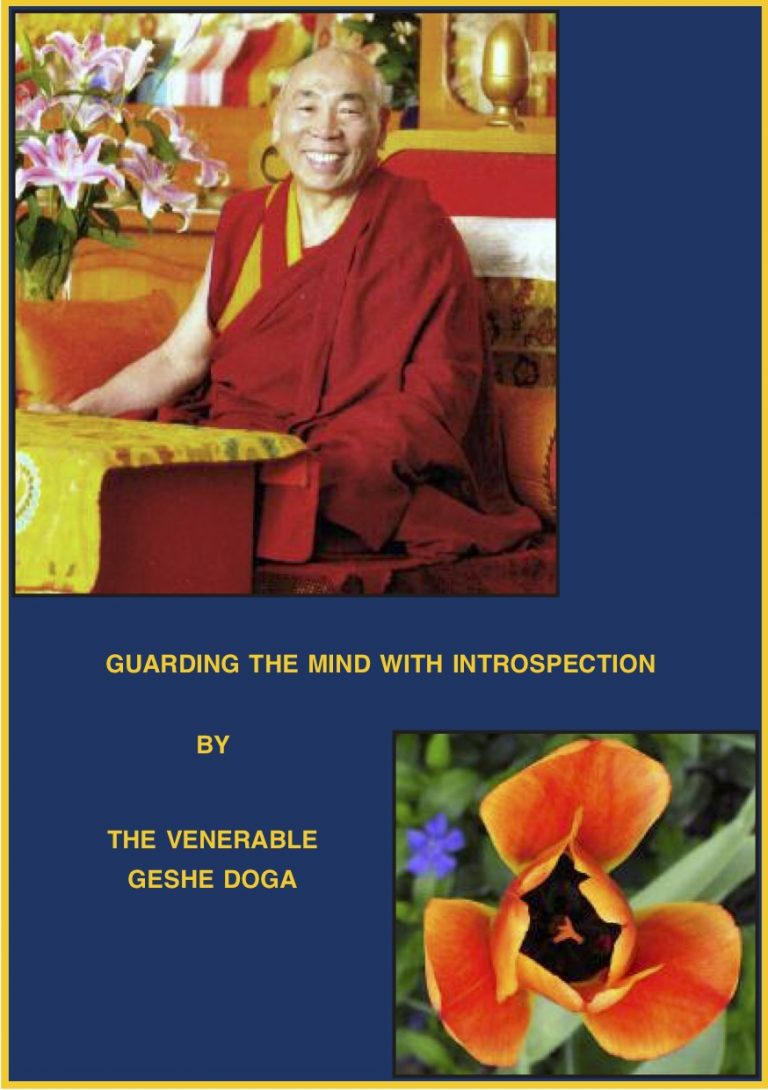
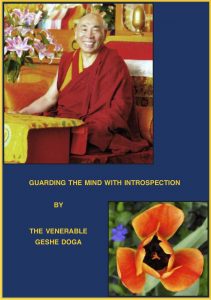
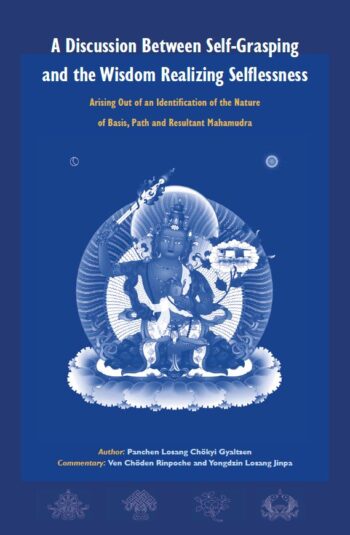
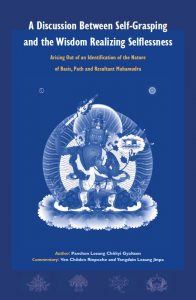
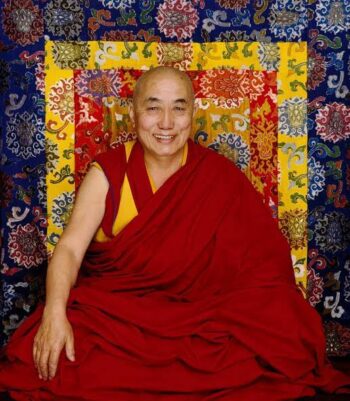
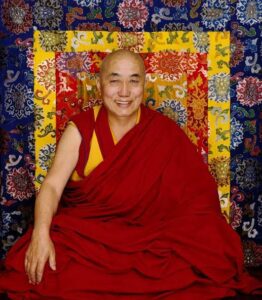
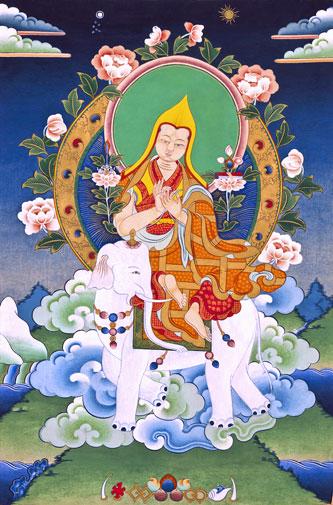
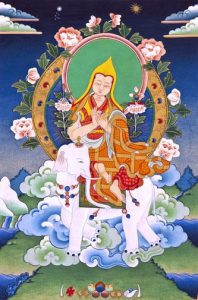 d root Guru,
d root Guru,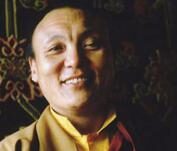
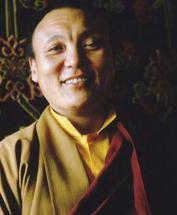 When beginning the preliminary practices (sngon gro) of Tibetan Buddhist meditation, it is extremely important to have complete faith in your teacher and in the teaching that he expounds. You should have no doubt that he is a Fully Awakened Being, or Buddha. Especially in regards to the Truth, or Dharma, you should not disparage the teachings of other traditions, holding yours to be superior. Simply consider that the teaching you follow is best suited to yourself. The various spiritual traditions are in accordance with the diverse dispositions and inclinations of the individuals.
When beginning the preliminary practices (sngon gro) of Tibetan Buddhist meditation, it is extremely important to have complete faith in your teacher and in the teaching that he expounds. You should have no doubt that he is a Fully Awakened Being, or Buddha. Especially in regards to the Truth, or Dharma, you should not disparage the teachings of other traditions, holding yours to be superior. Simply consider that the teaching you follow is best suited to yourself. The various spiritual traditions are in accordance with the diverse dispositions and inclinations of the individuals.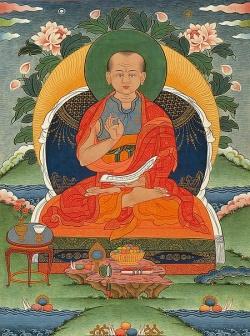
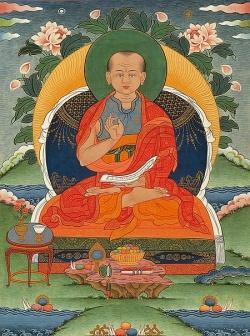 1. Determined to obtain the greatest possible benefit from all sentient beings, who are more precious than a wish-fulfilling jewel, I shall hold them most dear at all times.
1. Determined to obtain the greatest possible benefit from all sentient beings, who are more precious than a wish-fulfilling jewel, I shall hold them most dear at all times.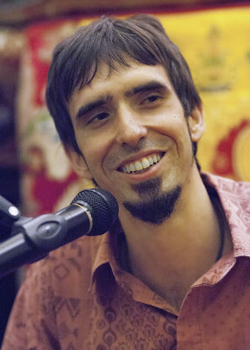
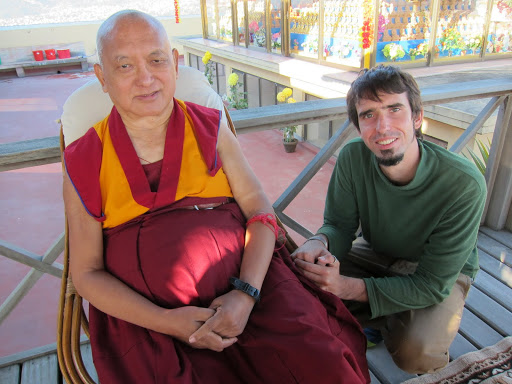

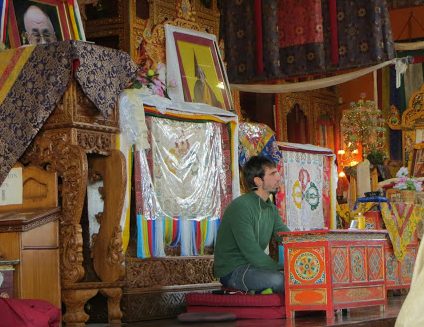
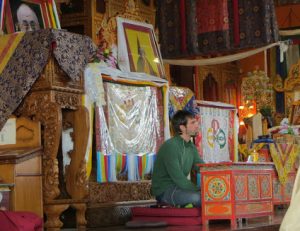 First Discourse: Dharma, Samsara, and Q&A
First Discourse: Dharma, Samsara, and Q&A Second Discourse: The Five Senses and Love
Second Discourse: The Five Senses and Love It's the law of the universe, it's the law of karma, it's the law of the human mind, right? Buddhism says it, so I don't have to say it. All of you know it, but I think it's important to really put it in practice, and not just to do meditation, read a book or come to puja. This is very good, this is a way to imprint, to put an imprint and keep on the right path, but the most important moment to put this into practice is when—like in English, I'm sorry to say, please don't get offended, in English they say—when shit hits the fan. Very metaphoric.
It's the law of the universe, it's the law of karma, it's the law of the human mind, right? Buddhism says it, so I don't have to say it. All of you know it, but I think it's important to really put it in practice, and not just to do meditation, read a book or come to puja. This is very good, this is a way to imprint, to put an imprint and keep on the right path, but the most important moment to put this into practice is when—like in English, I'm sorry to say, please don't get offended, in English they say—when shit hits the fan. Very metaphoric.